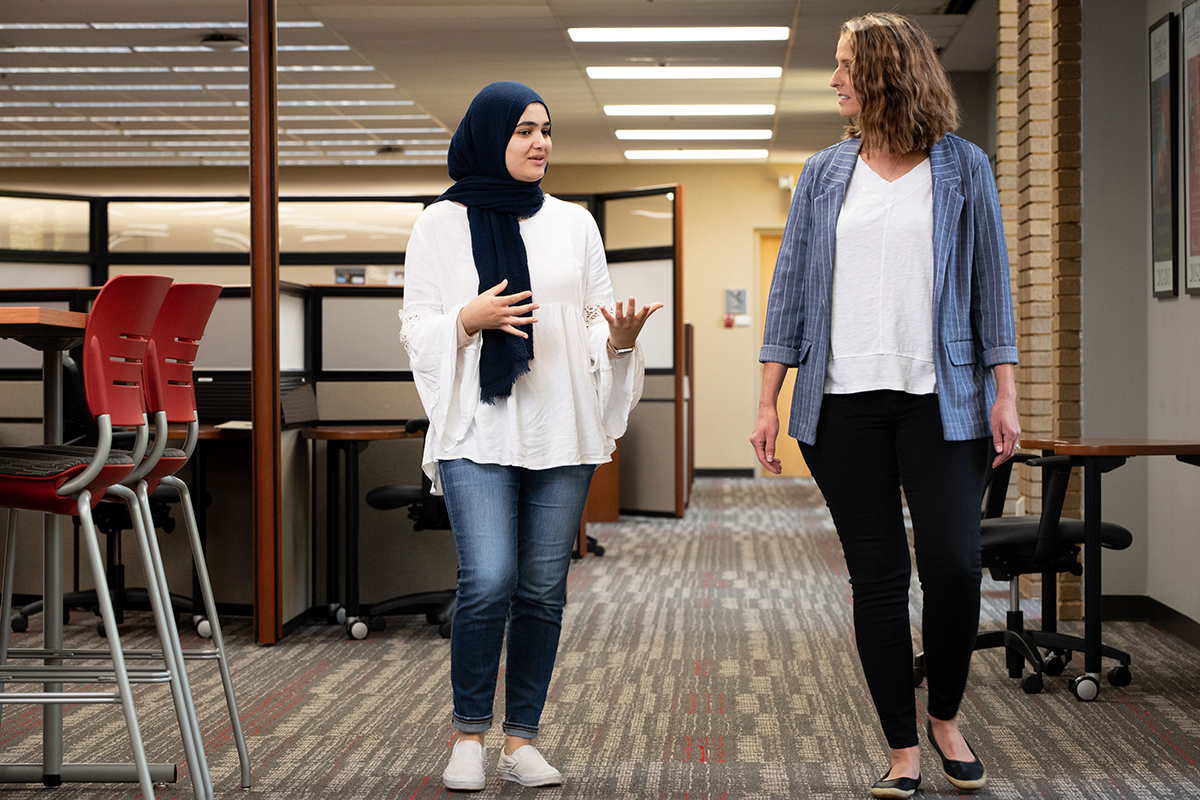Because of the pandemic, Maryville welcomed what amounts to two separate freshman classes for the 2021–2022 school year.
The first, of course, is made up of the traditional newcomers arriving to start their college careers. The other includes second-year students who never had a typical freshman experience because of the pandemic. For them, many parts of college life are likely to be new after a year of virtual classes and social distancing.
Learning how to spot challenges that members of either group may be facing — or any student, for that matter — is the focus of a new mental health initiative for Maryville faculty and staff. It gives new meaning and new emphasis to the Maryville slogan, “One Team, One Family.”
“We are coming in contact with much more social anxiety and grief this year,” said Jennifer Henry, MA, LPC, director of the counseling center. “Now that classes are in session, the counseling center staff participates in counseling sessions from when we arrive to when we leave.” Students can also reach a licensed counselor anytime, 24/7 by calling the Counseling Center Support Line. All Support Line calls are reviewed and followed up on by the main campus Counseling Center staff.
To help deal with reactions to the pandemic as well as other stresses, ranging from political discord to racial strife to foreign crises, the Counseling Center produced a series of digital resources. These include a recent video giving tips on how to regain mental and emotional balance. The Counseling Center’s Virtual Relaxation Room offers resources including meditation and relaxation exercises, peaceful music and a four-part stress management workshop.
Additionally, new training in Mental Health First Aid was made available to faculty and staff. Fifty individuals took advantage of the course, and are now certified for three years. There is also a waiting list of faculty and staff members interested in obtaining the training, with more sessions being planned.
Ashlyn Cunningham, OTD, OTR/L, associate professor of occupational therapy, is a certified instructor for Mental Health First Aid. She obtained a small grant from the Missouri Institute of Mental Health to offer the training this past August. The goal of the training was to equip faculty and staff to become better observers and responders to students in order to be able to spot problems before they become a serious mental health challenge.
“It’s our job to ask how they’re doing,” Cunningham said. “We talk in the training about how you look for early signs of mental health challenges and crisis situations. The earlier you can intervene, the more effective the help will be.
“At Maryville, we don’t teach classes of hundreds of students. We know our students, so we can notice a change. If we don’t get a person involved until they are in crisis, that’s a really hard place to come back from,” she said.
To help spread the word and the training, Kate Kline, PhD, LPC, CRC, associate professor of rehabilitation counseling, is leading a group of volunteer faculty members in ongoing training in what is known as The Pedagogy of Compassion.
There is a great deal of preliminary evidence demonstrating student (and faculty) mental health suffered during the pandemic. This group exists to acknowledge and accept this information, share and address the academic year moving forward, and develop active ways to support students (and each other) during the 2021-2022 academic year. Faculty will be asked to create self-assessments, student surveys, or other modalities that they can incorporate into classes to support student mental health, express care and concern for student well-being and model compassion for these unique times.
As a licensed professional counselor herself, Kline states, “You don’t need to be a therapist or have formal training in counseling to support students. The human soul wants to be witnessed, seen and companioned. Each faculty member brings remarkable assets and experiences that will enable them to connect and reconnect to students. By doing so, faculty can leverage healing power.”
Kline notes that because so many Maryville students, faculty and staff have gone through such a wide variety of experiences over the past 18 months, we can’t expect everyone to be starting at the same level. “You can’t use phrases like ‘Let’s catch up’ or ‘Let’s start where we left off,’” she said, because this creates added anxiety for students that we must be aware of and sensitive to. And, she adds, faculty members can’t be afraid to share their thoughts and feelings as classes work through academic material.
“We’re not only dealing with a pandemic,” Kline said, “but also with a major shift about social justice, so we’re encouraging faculty to consider other ways they can have these discussions with students and express to them ‘we’re also going through this’ and having a shared experience.
“Oftentimes, as counselors, we’re told not to share. We can’t do that right now. It’s very important that faculty know to let the guard down and acknowledge that we’re all going through something. Students need that from us. We’re encouraging faculty to exercise humanity with academics, to demonstrate that they are feeling feelings too, and not sacrifice rigor. We don’t sacrifice rigor, we practice compassion,” she said.
Henry agreed that the virus and its resurgence with the delta variant has given Maryville the chance to enhance its focus on ensuring everyone on campus is mentally healthy. She emphasizes that while it’s always a student’s choice to become involved in remedial efforts, “the most important thing is to give students access to talk to somebody, in the moment.”
“Training faculty on how to talk to students about mental health is always a focus for us, but the pandemic has increased the level of awareness on campus and across the nation,” Henry said. “Everyone is hungry to know what to do and how to help. It’s encouraging to see the enthusiasm and commitment across campus for caring for the mental health of our students. We’re all going through this — together.”
